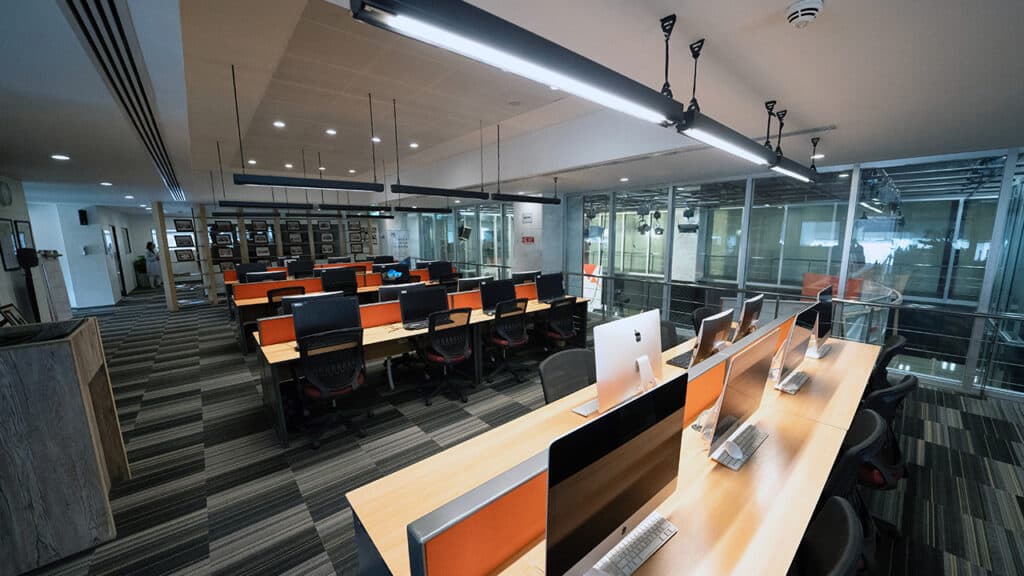Many businesses opt out of a seat leasing business model fearing data security issues. Data leaks are perpetual ten-headed monsters. A glitch can lead to a huge PR nightmare that can soon spiral to loss of confidence, a tarnished brand name, and inevitably, bankruptcy. Companies who have gone through this nightmare of a circus and bounced back are rare. This is why “an ounce of prevention is worth a pound of cure” has never been more true when it comes to data security.
Should you ditch the seat leasing model?
No. Here’s why.
Seat leasing is a popular option for businesses looking to establish a presence in a new location without the commitment of a long-term lease. This arrangement allows companies to rent office space, complete with all necessary infrastructure and amenities, on a short-term basis. By outsourcing office management to a third-party provider, businesses can focus on their core operations while still enjoying the benefits of a fully-equipped workspace. Seat leasing is particularly attractive to startups and small businesses that may not have the resources to set up and manage their own office space.
Data Security is top priority – which is why this should never be an issue
Prioritizing data security in seat leasing arrangements is crucial for maintaining the trust of clients and safeguarding the reputation of the business.
New to seat leasing? Here’s what to look for when it comes to data security measures:
Access control
One important data security measure in seat leasing is access control. By implementing strict protocols for who can access sensitive information, companies can ensure that only authorized personnel can view and manipulate data. This can include:
- Requiring employees to use secure passwords
- Implementing two-factor authentication; and
- Limiting access to certain areas of the office.
By carefully controlling who has access to data, companies can reduce the risk of unauthorized individuals obtaining sensitive information. Every employee should also be required to undergo thorough background checks and receive proper training on data security protocols. Additionally, access to certain areas of the office may be restricted to only those employees who have a legitimate need to be there, further minimizing the risk of unauthorized access. This level of control not only protects the company’s data but also instills a sense of accountability among employees to handle sensitive information with care and diligence.
To further enhance security measures within the office, biometric authentication should also be in place. Biometric authentication requires employees to scan their fingerprints or use facial recognition technology to gain access to certain areas, ensuring that only authorized individuals can enter. Keycard access systems provide an additional layer of security by requiring employees to swipe their unique keycards to unlock doors or access certain files or systems.
Last, but not least, check if your seat leasing provider must have protocols for monitoring employee activity to detect unauthorized access and potential security breaches. By implementing monitoring systems that track employee activity on company devices and networks, employers can quickly identify any suspicious behavior or unauthorized access attempts. This proactive approach allows for immediate intervention to prevent potential security threats before they escalate.
Regular audits and reviews of employee activity logs can also help to identify any weaknesses in the security system and address them promptly. By staying vigilant and actively monitoring employee activity, companies can effectively protect their sensitive data and maintain a strong security posture.
Encryption
Encryption is another crucial aspect of maintaining data security within a company. By encrypting sensitive information, such as customer data or financial records, companies can ensure that even if a breach were to occur, the data would be unreadable and unusable to unauthorized parties.
Encryption technology has evolved significantly in recent years, making it easier for companies to implement robust encryption protocols across their networks and devices. This added layer of security helps to safeguard sensitive information and mitigate the risk of data breaches. Additionally, regular encryption key management and updates are essential to ensure that encryption remains effective and up to date with the latest security standards. Overall, encryption plays a vital role in protecting company data and maintaining a secure business environment.
Keep in mind that data should be encrypted both in transit and at rest to prevent unauthorized access and ensure data integrity. In transit, data is encrypted as it travels between devices or across networks, making it unreadable to anyone without the proper decryption key. At rest, data is encrypted when stored on servers, laptops, or other devices, providing an extra layer of protection in case of a security breach. This dual approach to encryption helps to secure data at all times, whether it is being transmitted or stored and is crucial for maintaining the confidentiality and integrity of sensitive information.
Do they use secure protocols like SSL/TLS? SSL/TLS can further enhance data security by establishing a secure connection between devices and servers. SSL/TLS protocols encrypt data during transmission, preventing unauthorized parties from intercepting or tampering with sensitive information. By using these secure protocols, organizations can ensure that data exchanged over the internet is protected from potential threats and vulnerabilities. Additionally, SSL/TLS protocols help to verify the identity of servers and websites, reducing the risk of man-in-the-middle attacks and phishing scams. Overall, the use of secure protocols like SSL/TLS is essential for maintaining the confidentiality and authenticity of data in transit.
Are Encryption Keys in place? Encryption keys are managed securely to further enhance the protection of data during transmission. Encryption keys play a crucial role in ensuring that only authorized parties can access and decrypt the information being exchanged. Organizations must implement proper key management practices to safeguard these keys and prevent them from falling into the wrong hands. This includes securely storing and rotating encryption keys, as well as regularly updating and auditing key access controls. By carefully managing encryption keys, organizations can strengthen the security of their data and minimize the risk of unauthorized access or data breaches.
Secure network
A secure network infrastructure is another essential component of ensuring the security of data during transmission. This includes implementing firewalls, intrusion detection systems, and secure VPN connections to protect against unauthorized access and cyber-attacks. Regularly updating and patching network devices and software is also crucial to address any vulnerabilities that could be exploited by malicious actors. Additionally, organizations should monitor network traffic and conduct regular security audits to detect and respond to any suspicious activity. By securing their network infrastructure, organizations can create a strong defense against potential threats and safeguard the confidentiality and integrity of their data.
Firewalls and intrusion detection systems should be in place to help detect and block any unauthorized access attempts. Firewalls act as a barrier between a trusted internal network and untrusted external networks, filtering incoming and outgoing traffic based on predetermined security rules. Intrusion detection systems, on the other hand, continuously monitor network traffic for signs of suspicious activity or potential security breaches. Together, these tools provide an added layer of protection against cyber-attacks and unauthorized access to sensitive data. Regularly reviewing and updating firewall rules and intrusion detection system settings is essential to ensure they remain effective in defending against evolving threats in the ever-changing cybersecurity landscape.
Regular security audits and penetration testing are also crucial components of a comprehensive cybersecurity strategy. Security audits involve evaluating the effectiveness of existing security measures and identifying any vulnerabilities that may exist within the network or system. Penetration testing, on the other hand, involves simulating real-world cyber-attacks to identify potential weaknesses and assess the overall security posture of the organization. By regularly conducting these audits and tests, organizations can proactively identify and address any security gaps before they are exploited by malicious actors. This proactive approach to cybersecurity can help prevent costly data breaches and protect sensitive information from falling into the wrong hands.
Redundant network infrastructure to prevent downtime. One key component of a robust cybersecurity strategy is implementing redundant network infrastructure to prevent downtime. This involves creating backup systems and duplicate resources that can seamlessly take over in the event of a network failure or cyber-attack. By having redundant systems in place, organizations can ensure that critical operations continue running smoothly even in the face of unexpected disruptions. This not only helps to minimize downtime and maintain productivity but also enhances the overall resilience of the network infrastructure against potential threats.
Compliance with data protection regulations (GDPR and HIPAA)
GDPR compliance is a crucial aspect of maintaining the security and integrity of data within an organization.
The General Data Protection Regulation (GDPR) sets strict guidelines for how personal data should be collected, processed, and stored. Failure to comply with these regulations can result in hefty fines and damage to a company’s reputation. Therefore, organizations need to implement robust data protection measures to ensure GDPR compliance. This includes implementing encryption protocols, access controls, and data retention policies to safeguard sensitive information from unauthorized access or disclosure. Additionally, regular audits and assessments should be conducted to identify and address any potential vulnerabilities in the data protection framework. By prioritizing GDPR compliance, organizations can demonstrate their commitment to protecting customer data and upholding the highest standards of data privacy.
Seat leasing providers must comply with GDPR
This is done to protect the personal data of their clients and ensure the security of sensitive information. This also means that seat leasing providers must implement encryption protocols, access controls, and data retention policies to prevent any unauthorized access to data. Regular audits and assessments are essential to identify and address any vulnerabilities in their data protection framework, ensuring that customer data is kept safe and secure at all times. Failure to comply with GDPR can result in hefty fines and damage to the reputation of the organization, making it crucial for seat leasing providers to prioritize GDPR compliance in their operations.
Data processing agreements must be in place
From the get-go, seat leasing providers and their clients must clearly outline the responsibilities and obligations of each party when it comes to handling personal data. These agreements specify how data will be processed, stored, and protected, as well as the procedures for data breaches and reporting. By having these agreements in place, both parties can ensure that they are meeting GDPR requirements and protecting the privacy of individuals whose data is being processed. Additionally, seat leasing providers must regularly review and update these agreements to stay current with any changes in regulations or best practices in data protection. This proactive approach helps to mitigate risks and demonstrate a commitment to compliance with GDPR.
Regular audits to ensure compliance
With GDPR are essential for seat leasing providers. These audits should include thorough examinations of data processing activities, security measures, and documentation of data protection practices. By conducting regular audits, seat leasing providers can identify any gaps or weaknesses in their data protection measures and take corrective action to address them. This proactive approach not only helps to prevent data breaches but also demonstrates a commitment to compliance with GDPR regulations. In addition to internal audits, seat leasing providers should also consider engaging third-party auditors to provide an objective assessment of their data protection practices. This external validation can help to instill confidence in clients and stakeholders that the provider is taking the necessary steps to protect data privacy.
HIPAA compliance
HIPAA is another crucial aspect that seat leasing providers must prioritize to ensure the security and confidentiality of sensitive patient information. The Health Insurance Portability and Accountability Act (HIPAA) sets strict standards for the protection of healthcare data, and failure to comply can result in severe penalties and reputational damage. Therefore, seat leasing providers must conduct regular audits and assessments to ensure that their processes and systems meet HIPAA requirements. This includes implementing appropriate technical safeguards, such as encryption and access controls, as well as administrative measures like training staff on data security best practices. By prioritizing HIPAA compliance, seat leasing providers can not only protect their clients’ data but also maintain the trust and confidence of healthcare organizations that rely on their services.
1. Healthcare clients must be able to trust seat leasing providers to handle sensitive patient data with the utmost care and attention to detail. By adhering to HIPAA regulations and regularly auditing their processes, seat leasing providers demonstrate their commitment to maintaining the confidentiality and integrity of healthcare information. This level of trust is essential for healthcare organizations, as they rely on seat leasing providers to securely handle patient data as per industry standards. Additionally, by prioritizing HIPAA compliance, seat leasing providers can differentiate themselves in the competitive healthcare market and attract new clients who prioritize data security and regulatory compliance.
2. Encryption and access control measures to protect patient information are crucial components of maintaining HIPAA compliance. By implementing strong encryption protocols and restricting access to sensitive data, seat leasing providers can ensure that patient information is kept safe from unauthorized access or breaches. This not only helps to protect the privacy of patients but also helps to build trust with healthcare organizations that rely on these providers to safeguard their data. In addition, regular security audits and assessments can help identify any vulnerabilities and ensure that the necessary measures are in place to prevent data breaches and maintain compliance with HIPAA regulations.
3. Compliance with HIPAA regulations on data security and privacy is essential for all healthcare organizations and their service providers. Failure to comply with these regulations can result in hefty fines and damage to a provider’s reputation. By adhering to HIPAA guidelines, seat leasing providers can demonstrate their commitment to protecting patient information and maintaining the highest standards of data security. This not only benefits the healthcare organizations they serve but also helps to maintain the integrity and trustworthiness of the entire healthcare industry.

Other data protection regulations
Compliance with industry-specific regulations
In addition to HIPAA, healthcare organizations may also be subject to regulations such as the Health Information Technology for Economic and Clinical Health (HITECH) Act and the General Data Protection Regulation (GDPR) in Europe. These regulations require providers to implement robust data protection measures, including encryption, access controls, and regular security audits. Failure to comply with these regulations can have serious consequences, including financial penalties and legal action. As such, seat leasing providers must stay informed about the latest developments in data protection laws and take proactive steps to ensure compliance.
Data protection policies and procedures
Are policies and procedures regularly reviewed and updated to reflect changes in regulations and best practices? This includes conducting regular risk assessments to identify potential vulnerabilities and implementing appropriate safeguards to mitigate these risks. Additionally, staff training and awareness programs should be part of your seat leasing provider’s protocols to ensure that all employees understand their responsibilities in protecting sensitive data. By taking a proactive approach to data protection, seat leasing providers not only avoid costly penalties but also build trust with their clients and demonstrate their commitment to safeguarding sensitive information.
How does your provider conduct training?
Regular employee training on data security best practices can help reinforce the importance of protecting sensitive information. It shouldn’t just be a byword at work. Their training should cover topics such as password management, secure file sharing, and how to identify and report potential security threats. By regularly educating staff on the latest data security best practices, seat leasing providers can ensure that their employees are equipped to handle potential risks effectively. This proactive approach to employee training can help create a culture of data security awareness within the organization, ultimately reducing the likelihood of data breaches and maintaining client trust.
Data security best practices in seat leasing
Regular training on data security best practices is essential in the seat leasing industry to ensure that employees are knowledgeable and prepared to handle potential security threats. This training should cover topics such as password management, secure file-sharing protocols, and how to identify and report suspicious activity. By providing ongoing education to staff, seat leasing providers can empower their employees to be proactive in protecting sensitive information and maintaining a secure work environment. Additionally, regular training sessions can help reinforce the importance of data security and foster a culture of vigilance among employees.
Awareness of social engineering attacks is also crucial in ensuring the security of a company’s data. Employees should be trained to recognize common tactics used by cybercriminals, such as phishing emails and phone scams. By educating staff on how to spot and respond to these types of attacks, seat leasing providers can significantly reduce the risk of a security breach. Employees need to understand that they play a vital role in maintaining the security of the company’s information and that their vigilance is essential in preventing data breaches. Regular training on social engineering attacks can help employees stay alert and prepared to protect sensitive data from malicious threats.
Reporting security incidents and breaches is another crucial aspect of maintaining cybersecurity within a seat leasing provider. Employees should be encouraged to report any suspicious activity or potential security breaches immediately to the appropriate IT or security team. Prompt reporting can help mitigate the impact of a security incident and prevent further damage to the company’s data and systems. Additionally, having clear protocols in place for reporting security incidents can streamline the response process and ensure that incidents are addressed in a timely and effective manner. Regular drills and exercises can also help employees practice their response to security incidents and ensure that they are prepared to handle any potential threats. By fostering a culture of reporting and response, seat leasing providers can better protect their data and minimize the risk of a cybersecurity breach.
Incident response plan implementation is crucial in ensuring the effectiveness of a company’s cybersecurity measures. This plan should outline the steps to be taken in the event of a security incident, including who should be notified, how the incident should be investigated, and what actions should be taken to mitigate any potential damage. It is important for seat leasing providers to regularly review and update their incident response plans to account for new threats and vulnerabilities in the ever-evolving cybersecurity landscape. By being proactive and prepared, companies can significantly reduce the impact of security incidents and protect their valuable data and systems.
Ask if your seat leasing provider has a response plan in place that outlines the specific roles and responsibilities of key personnel in the event of a security incident. This plan should include clear communication protocols, escalation procedures, and a detailed incident reporting process. Regular training and drills should also be conducted to ensure that all employees are familiar with the plan and can respond effectively in a crisis. By prioritizing security and having a well-defined incident response plan, seat leasing providers can minimize downtime, financial losses, and reputational damage in the event of a security breach.
Further, seat leasing providers should also invest in advanced monitoring tools and technologies that can quickly identify any suspicious activity or breaches in their systems. Having a dedicated team of security experts who are trained to respond to incidents promptly and effectively is essential. By promptly detecting and responding to security incidents, seat leasing providers can minimize the impact on their operations and protect their clients’ sensitive data.
Of course, coordination with clients on incident response is also crucial for seat leasing providers. Establishing clear communication channels and protocols for reporting and addressing security incidents can help ensure a swift and coordinated response. Seat leasing providers need to work closely with their clients to develop incident response plans and conduct regular training exercises to ensure that everyone knows their role in the event of a security breach. By collaborating with clients on incident response, seat leasing providers can strengthen their overall security posture and better protect their clients’ data.
When mayhem hits the fan, what are their protocols for damage control?
Data backup and disaster recovery are essential components of any comprehensive security strategy. Seat leasing providers must have robust data backup procedures in place to ensure that client data is regularly backed up and stored securely. In the event of a disaster or security breach, having a reliable data backup system in place can help minimize data loss and downtime. Additionally, seat leasing providers should have a well-defined disaster recovery plan that outlines the steps to take in the event of a data loss or system failure. Regular testing and updating of these plans is crucial to ensure that they remain effective and up-to-date.
1. Regular data backups to prevent data loss are essential for seat leasing providers to maintain the integrity and security of client information. By implementing a routine backup schedule, providers can ensure that in the event of any unforeseen circumstances, such as hardware failure or cyber attacks, they can quickly restore data and resume operations. This proactive approach not only protects the interests of clients but also safeguards the reputation and credibility of the leasing provider in the industry. Additionally, regular monitoring and verification of backup systems can help identify any potential issues or weaknesses that need to be addressed promptly. By prioritizing data backup and disaster recovery planning, seat leasing providers can demonstrate their commitment to data security and business continuity.
2. Disaster recovery plans in place for quick recovery in case of emergencies include detailed procedures for data restoration, communication protocols, and alternative work arrangements. These plans outline the steps to be taken during and after a disaster to ensure minimal disruption to operations. By having these plans in place, seat leasing providers can effectively respond to emergencies and mitigate the impact on their clients’ businesses. Regular testing and updates of these plans are essential to ensure their effectiveness and relevance in the event of a real-life emergency. In conclusion, disaster recovery planning is a crucial aspect of seat leasing operations that should not be overlooked. By investing time and resources in proactive measures, providers can build trust with their clients and maintain a competitive edge in the industry.
3. Redundant systems and backups in different locations are also important components of a comprehensive disaster recovery plan. This ensures that even if one location is compromised, operations can continue smoothly from another site. By implementing these measures, seat leasing providers can assure their clients of the reliability and resilience of their services, ultimately enhancing their reputation and attracting more business. In today’s fast-paced and unpredictable business environment, having a solid disaster recovery plan is not just a good practice, but a necessity for long-term success.
A reputable seat leasing company cannot be stressed enough as they play a critical role in data protection and business continuity in the case of unanticipated calamities.
Secure your data.
NEARSOL is a US-based BPO and service company that offers clients custom-design solutions. With major hubs in Manila and Iloilo, it began operations in 2011 and has since gained a strong presence in the Latin American regions, the Caribbean, and the Asia Pacific, winning many awards for quality and service along the way. Most recent of which is its Great Place to Work-Certified™ Recognition, a global accreditation that tells stakeholders what employees think of the company culture.
Visit our LinkedIn to learn more about our company and our global footprint.





